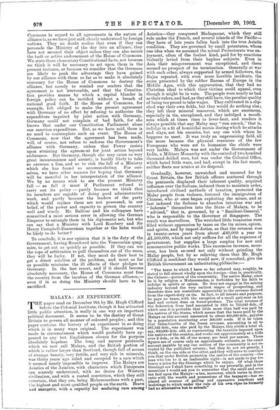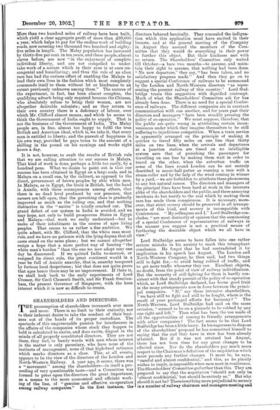MALAYA : AN EXPERIMENT.
T" paper read on December 9th by Mr. Hugh Clifford before the Colonial Institute, though it has attracted little public attention, is really in one way an important political document. It seems to be the destiny of Great Britain to govern all manner of coloured peoples ; and this paper contains the history of an experiment in so doing which is in many ways original. The experiment was made in circumstances which would probably have ap- peared to any but Englishmen chosen for the purpose absolutely hopeless. The long and narrow peninsula which we now call Malaya, and the British portion of which is rather larger than Scotland, though full of scenes of strange beauty, very fertile, and very rich in minerals, was thirty years ago ruled and occupied by a race which it seemed nearly impossible to improve. The Malays are Asiatics of the Asiatics, with characters which Europeans can scarcely understand, with no desire for Western civilisation, and with a rooted conviction, which they still entertain, that they are, being Mahommedans with a past, the highest and most qualified people on the earth. Brave and energetic, with a capacity for seafaring rare among Asiatics—they conquered Madagascar, which they still rule under the French, and several islands of the Pacific— they have of late years fallen back into the true Asiatic condition. They are governed by small potentates, whose one idea when we assumed the actual Protectorate was en- joyment, often of the foulest kind, paid for by exactions violently levied from their hapless subjects. Even in Asia their misgovernment was exceptional, and there seemed no prospect of its termination. Generally at war with each other, always supported by armed followers, the Rajas repeated, with even more horrible incidents, the scene presented by the robber Barons of Europe in the Middle Ages, with this aggravation, that they had no Christian ideal to which their victims could appeal, even though it might be in vain. The people were nearly as bad as their rulers, and had, as they still have, the peculiar quality of being too proud to take wages. They cultivated in a slip. shod way their own fields, but they would do nothing else; they left their mineral resources, which are enormous, especially in tin, unexplored, and they indulged a moodi- ness which at times rises to fever-heat, and renders it always possible that any Malay may "run amuck," that is, indulge in a fit of homicidal mania during which he attacks and slays, not his enemies, but any one with whom he happens to meet. It was truly an unpromising field, all the more because the physical resources of the few Europeans who were set to humanise the chiefs were very feeble. Malaya was not under the Government of India, a Military Monarchy with the control of two hundred thousand drilled men, but was under the Colonial Office, which hated little wars, and had, except in the last resort, neither fleets nor armies at its disposal.
Gradually, however, unwatched and uncared for by Great Britain, the few British officers scattered through the peninsula displayed their inherent quality, acquired influence over the Sultans, induced them to maintain order, introduced civilised methods of taxation, protected the Malay people from violence, fostered the immigration of Chinese, who at once began exploiting the mines, and at last induced the Sultans to abandon intestine war and " federate " themselves into the State of Malaya, to be " advised," that is, governed, by a " Resident-General," who is responsible to the Governor of Singapore. The result was marvellous. The wretched little treasuries were filled without oppression by taxes on the tin mines, opium, and spirits, and by import-duties, so that the revenue rose in twenty-seven years from about £40,000 a year to £1,500,000, which not only suffices for all the expenses of government, but supplies a large surplus for new and remunerative public works. This enormous increase, more- over, has been secured not only without grinding the Malay people, but by so relieving them that Mr. Hugh Clifford is confident they would now, if consulted, give the British Government an unhesitating plebiscite:— " The taxes to which I have so far referred may, roughly, be stated to fall almost wholly upon the foreign—that is, practically, the Chinese—portion of the community. The native Malay, since he is by religion a Muhammadan, is forbidden by his faith to indulge in spirits or opium. He does not engage in the mining industry beyond the very earliest stages of prospecting, and therefore does not contribute appreciably to the revenue derived from the export-duty on tin. In fact, to all intents and purposes, he pays no taxes, with the exception of a small quit-rent on his land and certain dues on forest-produce. The total revenue of the federation from land amounted in 1901 to 763,643 dols., of which sum it is probable that little more than half was paid by the natives of the States, which means that the taxes paid by the Malays on this account amounted to about 400,000 dols., payable by a population numbering over 300,000 souls. If it be taken that three-fourths of the forest revenue, amounting in all to 287,542 dols., was also paid by the Malays, this yields a total of, say, 600,000 dols. odd, as representing the taxation imposed upon the natives of the country, and works out approximately at a trifle over 2 dole., or 3s. 6d. of our money, per head per annum. These figures are of course only an approximate estimate, as the exact amount payable by any one section of the community is not re- vealed by the published returns ; but they do not err greatly, I think, on the one side or the other, and they will serve to convince you that under British protection the native of the country—the man who has to it an inalienable right—is not made to pay too heavy a price for the blessings which lie enjoys. Of what these blessings are I shall have something to say presently, and in the meantime I would ask you to remember that the small and even tax laid upon the Malaya—a tax, moreover, which varies in direct ratio with the wealth and possessions of the taxpayer—has re- placed all manner of galling and oppressive exactions and mulctings to which under the rule of his own rajas he formerly had no alternative but to submit." More than two hundred miles of railway have been built, which yield a clear aggregate profit of more than £80,000 a year, which helps to pay for the endless work of building roads, now covering two thousand two hundred and eighty- five miles in length. The Malay population has increased by thirty-five per cent. in ten years, and these people, almost slaves before, are now " in the enjoyment of complete individual liberty, and are not compelled to under- take work of a nature which in their eyes is at once un- congenial and humiliating ; and thus the rule of an alien race has had the curious effect of enabling the Malays to lead their own lives in the fashion which most completely commends itself to them without let or hindrance to an extent previously unknown among them." The success of the experiment, in fact, has been almost complete, the qualifying adverb being only required because the Chinese, who absolutely refuse to bring their women, are not altogether desirable colonists ; and as they return to their own country there is a deficiency of labour, over which Mr. Clifford almost moans, and which he seems to think the Government of India ought to supply. That is not the business of the Government of India. The Malay people are, in fine, almost too happy to fulfil the true British and American ideal, which is, we take it, that every man is entitled to liberty, and the pursuit of happiness in his own way, provided he pays taxes to the amount of a shilling in the pound on his earnings and works eight hours a day.
It is not, however, to exalt the results of British rule that we are calling attention to our success in Malaya. That kind of work is done, perhaps a little too easily, by a hundred pens. What we desire to point out is that our success has been obtained in Egypt on a large scale, and in Malaya on a small one, by the indirect, as opposed to the direct, government of brown peoples by able white men. In Malaya, as in Egypt, the brain is British, but the hand is Asiatic, with these consequences among others, that there is no dead level produced by our presence, that careers are left open, that the governing class is gradually improved as much as the toiling one, and that nothing distinctive in the " native " is totally crushed out. The grand defect of our system in India is avoided, and we may hope, not only to build prosperous States in Egypt and Malaya—that work we really understand—but to make of their inhabitants in the course of ages living peoples. That seems to us rather a fine ambition. We quite admit, with Mr. Clifford, that the white man must rule, and we have no patience with the lying dogma that all races stand on the same plane ; but we cannot altogether resign a hope that a more perfect way of bearing " the white man's burden " than the one we now adopt may one day be discovered. If we quitted India to-morrow, or resigned its direct rule, the great continent would in a year be full of Asiatic anarchy, that is, anarchy tempered by furious local despotisms ; but that does not quite prove that ages hence there may be no improvement. If there is, we shall look back to the early experiments of Lord Cromer, Sir Cecil Clementi Smith, and Sir Frank Swetten- ham, the present Governor of Singapore, with the keen interest which it is now so difficult to create.











































 Previous page
Previous page